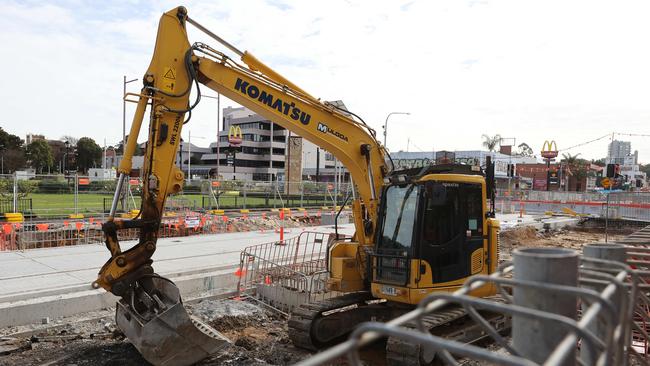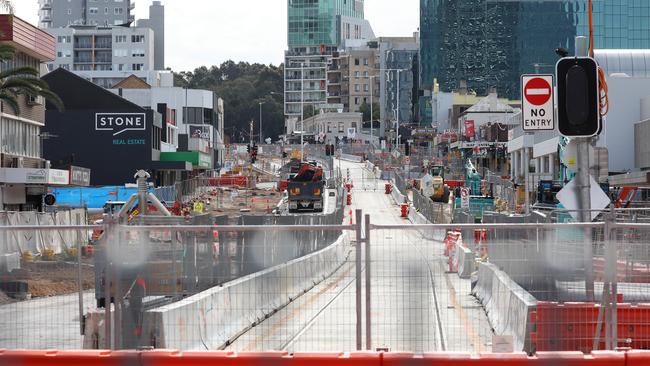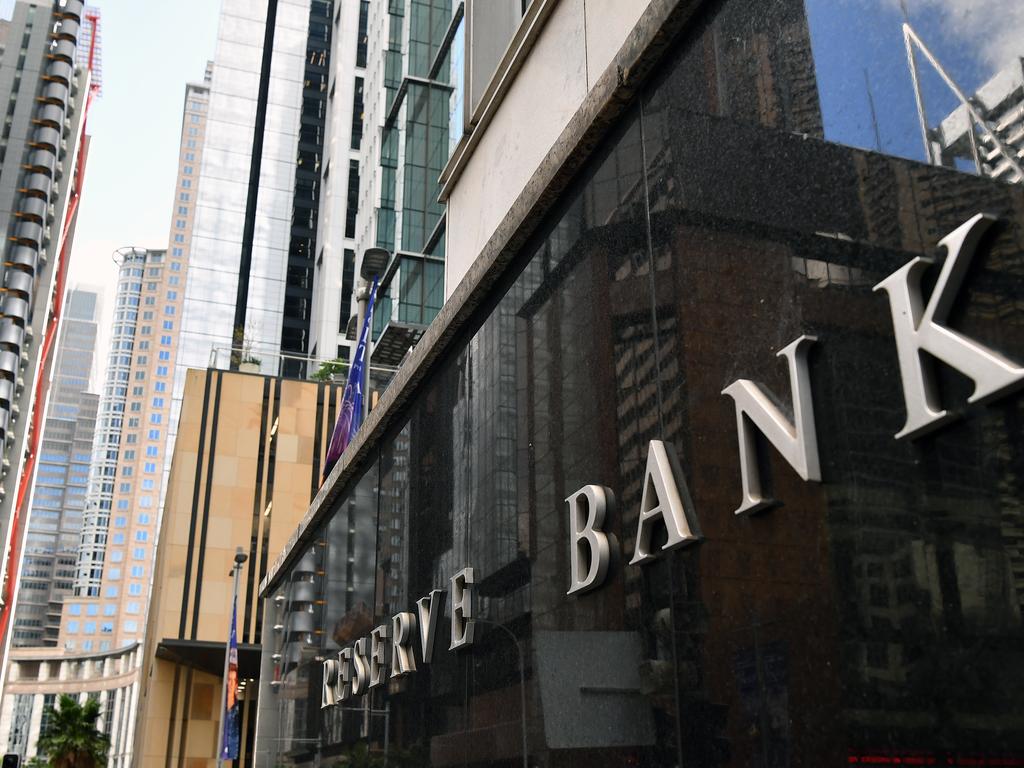Industry denounces Sydney’s snap construction halt
Major developers have warned that Sydney’s construction lockdown will hit smaller builders hardest and cost the economy an additional $2.5bn.

Major developers have warned that Sydney’s construction lockdown will hit smaller builders hardest and cost the economy an additional $2.5bn.
The NSW government’s sudden announcement over the weekend of a two-week building freeze rocked the industry, with key developers warning of problems for cash-strapped subcontractors and stretched supply chains.
Putting the industry into a lockdown in an attempt to limit the spread of Covid-19 will set back major infrastructure projects and crucial housing developments that were being used to propel the economic recovery.
In Sydney, apartment king Harry Triguboff – founder of Meriton Apartments which employs 2000 staff – warned that the economy will suffer shockwaves from the closure.
Mr Triguboff, who has a dozen apartment buildings under construction, said that mining and the building industry were keeping the economy buoyant.
“It’s terrible, because if you go along the freeways the only traffic is trucks and tradies. If you stop that you kill everything. By us building you keep everything going, including suppliers,” he said.
“It definitely cannot be done. It is good the builders are so angry. The government has started to listen and will soften its stance,” the billionaire said. “We are not getting anywhere. We are going backwards. We should be trying to stop the virus. All we are doing is counting how many people have it,” he said.
“There is a short supply of accommodation in apartments. We have dropped the numbers we are building by half,” he said.
Mr Triguboff said it was troubling that the government had stopped work on its infrastructure projects. “It is extremely important that we are bringing everything up to date – it’s not easy to start again,” he said.
“With us we have to try and control it … to stop working is not the answer. We have to keep working.”
Development lobby group Urban Taskforce said the decision was harming the entire economy.
“The close-down of construction in NSW is an overreach that will cost the economy billions of dollars, resulting in a trail of litigation and claims that will take years to resolve,“ Urban Taskforce chief executive Tom Forrest said.
He argued that the move did not accord with data on the spread of the virus.
“This hasty decision wreaks of a government in panic following their indecision and lax attitude to the eastern suburbs Delta strain outbreak,” Mr Forrest said.
Hutchinson Builders managing director Scott Hutchinson said the decision must be obeyed, but he was mystified as to the rationale. “It hasn’t been necessary in any other state,” Mr Hutchison said.
“Half of these (health) decisions are made pragmatically, half of them are political. I don’t know which one this is,” he said.
NSW Premier Gladys Berejiklian said the decision to halt construction work until July 30 was intended to reduce the risk of workplace transmission, which had been a major contributor to the spread of the Delta variant through the city.
“Having the risk of thousands of people being mobile at one time, many of them coming from communities that have had cases, was too big a risk,” Ms Berejiklian said.
“The Treasurer and key senior public servants are meeting with the construction sector daily to make sure that when they go back to work there are safe places,” she said. “We can’t have people, who may not have symptoms, visiting multiple worksites, visiting sites with hundreds of workers and spreading the disease.”
Brickworks managing director Lindsay Partridge said the effect was not limited to major centres the company was developing for Amazon and Coles. “We are also not delivering product to housing builders,“ he said.

Mr Partridge said the stoppage would put the company back a couple of weeks and warned the burden would fall on smaller builders, who would find it difficult because they would not be receiving progress payments but must still meet overheads. “I’m concerned for them,” he said.
The building materials company wants to keep its NSW facilities running, but could run out of storage space unless the industry restarts. “We want to keep our plants turning over,” he said. ”By the end of the month we’ll have to take the plants offline.”
Brickworks has six plants in NSW that can carry some stock but it is not worthwhile to move materials around.
Mr Partridge questioned the strict application of the rules, saying many home builders worked on only one site in a team of three or four people, in contrast to the group’s Amazon project, where 1000 workers could be on site.
“I can understand concern about a site like that but with the house builders, it doesn’t impact in the same way,” he said.
Bede Noonan, chief executive of ACCIONA Geotech, said the company’s work at Western Sydney Airport and WestConnex was affected, along with supply chains. “We’re being affected nationally even in the states that have not done lockdowns,” he said.
But he pointed to the co-operative approach taken by government, builders, suppliers and unions in getting through the crisis, with “traditional barriers” put aside to relieve pressure points.
Building giant Multiplex, which is undertaking major projects across Sydney, has five sites hit by closures.
It will have about 2000 people out of work over the next fortnight.
BIS Oxford Economics estimated that construction work will fall by 15 per cent or $2.5bn in this quarter, and warned that due to spillover effects to other parts of the economy the near-term outlook for national GDP would be revised down “modestly”.
About 280,000 construction sector workers will be directly impacted, with further indirect consequences for the transport, manufacturing and wholesale sectors.
The research house said the restrictions on construction were the harshest seen in Australia.
It expected a gradual exit but warned that it could drag on.
“We expect the freeze to end as scheduled at the end of July, to be replaced with targeted restrictions like those adopted in Melbourne, for a further four weeks. Nonetheless, uncertainty is elevated, with an extension to the construction freeze a distinct possibility,” BIS Oxford Economics said.
“While there will be fallout, in activity terms the impact will be transitory, with the industry catching up on work as restrictions ease into the fourth quarter of 2021 and the first quarter of 2022.”
Construction had bounced back from other lockdowns but BIS Oxford Economics said pressure on material and labour supplies had increased, with bottlenecks and price inflation on some key inputs, potentially slowing the catch-up.
At the height of Melbourne’s second wave of Covid-19, the number of onsite workers for major construction was scaled back to 25 per cent of normal workforce.
Smaller projects were allowed to proceed with up to five people per site, while large-scale government projects had their workers onsite halved.







To join the conversation, please log in. Don't have an account? Register
Join the conversation, you are commenting as Logout